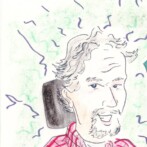Stop This Horrible Mental Health Bill by Contacting Your US Senators Now!
Last month, 6 July 2016, the US House quietly and overwhelmingly (422 to 2) passed the worst piece of mental health legislation I have seen in my 42 years of human rights activism. HR 2646 is sponsored by Rep. Tim Murphy (R-PA) and is mis-named the “Helping Families in Mental Crisis Act of 2016.”
This month of August, you can stop this frightening bill by contacting both of your US Senators. In fact, I would encourage you to also contact Sen. Bernie Sanders (D-VT), because he has shown signs over the decades of supporting our revolution in mental health care. Of course, you may contact Bernie wherever you live in the world.
First, I will try to briefly explain this bill and the main reasons I oppose it. But you, dear reader, will I hope take action and contact US Senators, because we only have weeks to turn this around!
Why We Must All Act Now To Stop This Bill!
Rep. Tim Murphy is the only psychologist in Congress, today. His enormous and expensive bill is supposedly a response to mass shootings, but incredibly the Committee in the House that debated this legislation continued a multi-decade US Congressional ban on even studying or researching gun violence!
There are many bad parts to this bill, but just two that I would like to highlight are:
- It is disempowering! This bill would oppose the voice of mental health consumers and psychiatric survivors. The historic trend for the past few years has been to support the empowerment of mental health clients, but this bill, which is more than 100 pages long, excludes the perspective of the citizens directly impacted by mental health services.
- It supports forcibly drugging Americans in our own homes! The worst part of this bill, is that it would extend Federal grants for involuntary psychiatric treatment of American citizens directly in our own homes. Almost all USA States have passed such involuntary outpatient commitment laws, but these IOC laws are not used as much as fanatic tyrants would like, so this bill — supposedly by a “small government” Republican — gives taxpayer money to make sure Americans take our court-ordered psychiatric drugs while at home. This forced drugging is why I call this approach the “Bill Cosby School of Mental Health.” Seriously, this is chemical rape.
You Can Help Stop This Bill in The US Senate!
During the rest of this month of August, 2016, the disability movement is urgently asking you to contact US Senators to stop HR 2646 from contaminating a bill being considered by the Senate, S. 2680 “Mental Health Reform Act of 2016.” Some Congresspeople are trying to sneak in oppressive amendments from HR 2646 into S. 2680.
At the bottom you will find my letters to my USA Senators from Oregon, Ron Wyden and Jeff Merkley. Your own words would be best! For more information about this campaign you can also download this PDF fact sheet:
Senator Ron Wyden Has a Personal Connection to Mental Health
It is not well known, but the only sibling of Ron — Jeff Wyden — at first had a promising start in Stanford University, but at the age of 21 was diagnosed as schizophrenic. Before his early death, Jeff Wyden was to experience three decades of intense mental health treatment, including involuntary drugging and even involuntary electroshock.
The parents of Ron and Jeff were remarkable. Mother Edith, born in Koenigsberg, Germany, fled the Nazis at the age of 16. Father Peter, born in Berlin, Germany, fled the Nazis at the age of 13. Both parents began their free lives here in the USA. Peter became a journalist, and one of the ways Peter addressed his profound feelings involving the mental health system, was writing a book that was published in 1998 about his son, Jeff. I read this book when it was published, and frankly there was a lot of it with which I disagreed. For example, the author seemed to know a little about our psychiatric survivor social change movement, but I did not perceive a level of deep curiosity about us, but instead I felt some unfair criticism.
However, I know that there are very deep things going on with the human mind, and everyone deals with these difficulties in a variety of ways. A few months after Peter published what was to become the last of his one dozen books, he died of a stroke and subdermal hematoma at the age of 74, possibly related to a head injury he received upon bumping his head when exiting his car, according to his family.
Peter’s son Jeff also died, soon after his father, in 2002 at the age of 51, after living in a halfway house in San Jose. The main article I found about the death of Jeff Wyden said the cause of his death was not yet determined at the time of publishing.
Of course everyone’s life is far too complex to sum up, however, as a psychiatric survivor myself, who was also first diagnosed schizophrenic as a young adult inside a psychiatric institution while attending a prestigious college, I know that the trauma experienced by Jeff must resonate to this day with the whole Wyden family.
Over the decades I have had a few chances to talk with Senator Wyden both in Eugene and at his Senate office. He started his career as an activist for senior citizens, so I have always had hopes that he would support the goals of our social change movement. For example, during our work on electroshock, his office helped to prevent the rubber-stamping of the device by the FDA.
I have checked with an attorney, and though this might not be believed by the average person, Rep. Tim Murphy’s awful bill can be used for not only forcibly drugging, but court-ordered involuntary outpatient electroshock. Yes, I realize that the vast majority of involuntary psychiatry is about drugs. But once in a while, involuntary outpatient commitment has involved electroshock. For real! To research how this monstrosity has happened on the state level, please direct your search engine to these phrases:
- Ray Sandford electroshock
- Elizabeth Ellis electroshock
Here is my letter to Senator Ron Wyden:
Dear Ron and any staff work on disability or mental health:
Over the decades, Ron, we have met a few times, mainly here in Eugene and once in your in your Senate office. But you meet so many thousands of people, let me please sum up my 60 years:
I am a psychiatric survivor. I was diagnosed schizophrenic, locked up in a psychiatric institution several times, but recovered enough to spend my whole life working to improve the mental health system.
Ron, this is the most important letter I am writing to you!
You see, I feel that the US House has made a severe mistake a few weeks ago. Yes, they were well-meaning when they passed HR 2646, for mental health reform, but there are elements in there that make this among the very worst mental health bills I have ever seen! Please pass the Senate bill 2680 without the amendments from HR 2646, also known as the Murphy Bill.
Ron, the reason that I started this work about 40 years ago was that back then I was a working class kid from Chicago going to Harvard on scholarships. I ran into difficult times, and five times I was placed in psychiatric institutions, with diagnoses such as schizophrenia, clinical depression, and bipolar (then manic depression).
Thankfully, Harvard referred me in my senior year as an intern in the human rights social change movement led by other psychiatric survivors. I graduated with honors from Harvard in 1977, and I learned about community organizing and mental health. This became my career.
While I am retired now, I have spent my whole professional life as a human rights community organizer in mental health. Perhaps you might have remembered my work as co-founder of MindFreedom International, based here in Eugene. For 25 years I directed MindFreedom and it is one of the main independent human rights groups in mental health.
In 2012, I experienced a very bad fall which broke my neck. I am now a quad in a powerchair, with even better connections to the disability movement, as you might imagine.
The reason I am sending you and your staff this important, urgent message. It is important that you pass Senate Bill 2680, without the amendments from HR 2646. Specifically, since you are so busy, let me focus on two points:
- We in the disability movement have a unifying slogan: “Nothing about us without us!” Yet, HR 2646 silences the voices of people who have real-life experience with mental health issues. The trend in mental health, internationally, is for more empowerment. However, HR 2646 actually muzzles citizens with psychiatric disabilities from speaking up in our agencies!
- HR 2646 gives away precious taxpayer money through grant funding for what is mistakenly called “Assisted Outpatient Treatment.” This is actually forced psychiatry, usually forced drugging but sometimes even forced court-ordered electric shock. Can you imagine? There is no evidence that outpatient commitment is more effective than voluntary care.
Ron, of course I read your father’s book. Since this topic has impacted my whole family for some many decades I know this can be a controversial topic for many people.
As community organizers, we know that power can be used to silence or amplify people. Groups run by mental health consumers of course have many opinions. But there is unity when it comes to opposing HR 2646!
Please, oppose the amendments from HR 2646, and support S. 2680.
I look forward to your reply as soon as possible!
Sincerely,
David W. Oaks
Below is a copy of my letter sent yesterday by email to my other US Senator from Oregon, Jeff Merkley:
Dear Jeff and any staff work on disability or mental health:
Jeff, you have been a great voice for the powerless! This time, the group I am talking about is very powerless indeed. But we in Oregon lead the way to change how people in the mental health system are treated! Let me please sum up my 60 years:
I am a psychiatric survivor. I was diagnosed schizophrenic, locked up in a psychiatric institution several times, but recovered enough to spend my whole life working to improve the mental health system.
Jeff, this is the most important letter I am writing to you!
You see, I feel that the US House has made a severe mistake a few weeks ago. Yes, they were well-meaning when they passed HR 2646, for mental health reform, but there are elements in there that make this among the very worst mental health bills I have ever seen! Please pass the Senate bill 2680 without the amendments from HR 2646, also known as the Murphy Bill.
Jeff, the reason that I started this work about 40 years ago was that back then I was a working class kid from Chicago going to Harvard on scholarships. I ran into difficult times, and five times I was placed in psychiatric institutions, with diagnoses such as schizophrenia, clinical depression, and bipolar (then manic depression).
Thankfully, Harvard referred me in my senior year as an intern in the human rights social change movement led by other psychiatric survivors. I graduated with honors from Harvard in 1977, and I learned about community organizing and mental health. This became my career.
While I am retired now, I have spent my whole professional life as a human rights community organizer in mental health. I was a co-founder of MindFreedom International, based here in Eugene. For 25 years I directed MindFreedom and it is one of the main independent human rights groups in mental health.
In 2012, I experienced a very bad fall which broke my neck. I am now a quad in a powerchair, with even better connections to the disability movement, as you might imagine.
The reason I am sending you and your staff this important, urgent message. It is important that you pass Senate Bill 2680, without the amendments from HR 2646. Specifically, since you are so busy, let me focus on two points:
- We in the disability movement have a unifying slogan: “Nothing about us without us!” Yet, HR 2646 silences the voices of people who have real-life experience with mental health issues. The trend in mental health, internationally, is for more empowerment. However, HR 2646 actually muzzles citizens with psychiatric disabilities from speaking up in our agencies!
- HR 2646 gives away precious taxpayer money through grant funding for what is mistakenly called “Assisted Outpatient Treatment.” This is actually forced psychiatry, usually forced drugging but sometimes even forced court-ordered electric shock. Can you imagine? There is no evidence that outpatient commitment is more effective than voluntary care.
Jeff, since this topic has impacted my whole family for some many decades I know this can be a controversial topic for many people.
As community organizers, we know that power can be used to silence or amplify people. Groups run by mental health consumers of course have many opinions. But there is unity when it comes to opposing HR 2646!
Please, oppose the amendments from HR 2646, and support S. 2680.
I look forward to your reply as soon as possible!
Sincerely,
David W. Oaks
Read More









